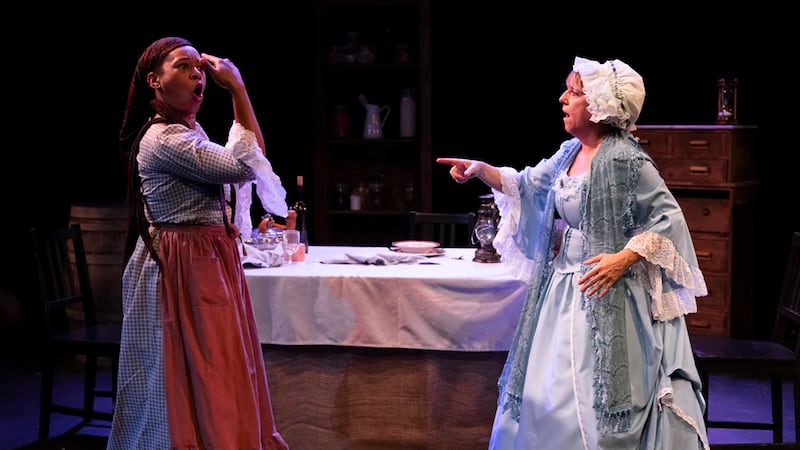What do you get when you mix theatrics with slavery, democracy and the culinary arts? A surprising educational tale, that’s what.
In the upcoming collaboration between CoHo Productions and Vanport Mosaic, Martha Bakes, those three concepts are explored via three very different genres onstage: historical biography, cooking show and one-woman satire.
Written by playwright Don Wilson Glenn and directed by Vanport Mosaic’s Damaris Webb, Martha Bakes features Melanie Moseley and Victoria Alvarez Chacon as original first lady Martha Washington and her slave Ona Marie Judge. The script was inspired by a story passed down through Glenn’s family about George Washington’s last will and testament—specifically, the part that set George Washington’s Mount Vernon slaves free after the death of Martha.
“This was folklore that was part of our culture and told in different ways through enslaved people, and then passed on to their children and grandchildren, and I thought it was unique,” says Glenn. “I think Washington’s will was the first big news that was swept under the rug. He was such an important person of his era—everything he did influenced the nation. He chopped down a cherry tree, he didn’t tell a lie. Those were moralities that were part of our growth as a country, so I truly believe that Washington felt that this would make a big impact on the country as well.”
Now, as the tale comes to life for vaccinated and masked audiences at CoHo Theatre, it also commemorates the 100th anniversary of the ratification of the 13th Amendment that abolished slavery. WW spoke with director Webb on the process of turning an oral tradition into a play and why it should continue to be passed along to future generations.
WW: Tell us more about where the idea for the play came from. It’s described as “part cooking show” plus “part historical biography” plus “one-woman show,” and that sounds like so much in one production.
Damaris Webb: Don and I were sitting in my yard talking about how the 100th anniversary of the ratification of the 13th Amendment was coming up. He had been doing some research into Martha Washington, because he was reflecting on a story that’s been passed down through his family. In his ancestry, there were the enslaved and owned from the derivative of Mount Vernon. When George died, he said in his will that upon Martha’s subsequent death, all of the Washington slaves should be set free, but he would leave them for her comfort and survival. We were kind of joking about, “What if the slaves had learned that the only thing standing between them and their freedom was his wife? What would that be like?”
So how does cooking play into the story?
The study of food is an introductory way into the life of people, and the curiosity of these stories and recipes gets passed down from one generation to another. They’re usually through the matriarchal line—what’s held in those stories, in the cooking, in the tending to and the feeding of the people. Then, of course, there’s Martha [Washington] and Martha Stewart’s cooking show, so the idea kind of came together as another device to break the fourth wall.
The first act focuses solely on Martha and the second act is Ona’s, so what do we take away from their relationship?
Martha has certain legal standing as a widow—a white woman widow with money—but neither of them has a voice. They don’t have a vote. Without giving too much away, that’s really what they’re trying to unpack. But the kitchen—it all takes place in the colonial kitchen, and that’s the important part.
When it comes to some of those devices, is there any localized level to the play?
This was written about a year ago, so there have been subsequent drafts, but the Portland protests and the Black Lives Matter movement have influenced the play. That would be the most Portland-specific part of it—what happened here for the George Floyd protests. I do think these are excellent things to think about, how to make things locally relevant with questions that could invigorate the pointing-to’s in your own community and start conversations.
SEE IT: Martha Bakes plays at CoHo Theatre, 2257 NW Raleigh St., 503-220-2646, cohoproductions.org. 7:30 pm Thursday-Saturday and 2 pm Sunday, Oct. 14-17. $5-$50 donation suggested.
